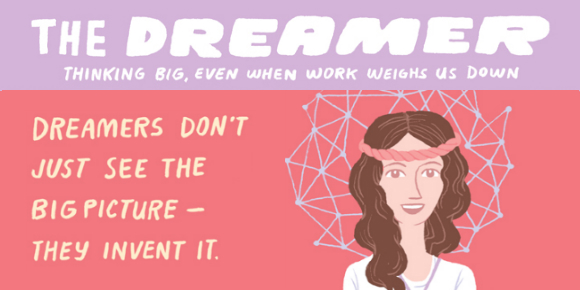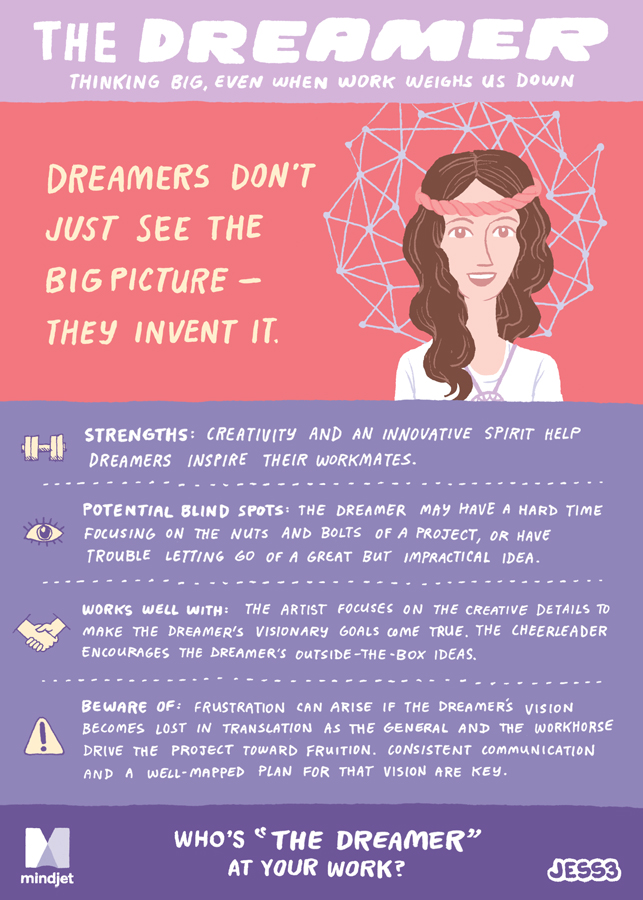Making the most of your work day can be a challenge. Mindjet’s Workology series will help you work smarter and more effectively with your workmates by introducing you to – and providing keys to working with – some common personality types found in any office.
“The world needs dreamers and the world needs doers. But above all, the world needs dreamers who do,” said the writer Sarah Ban Breathnach. Indeed, Dreamers are an integral part of any successful team. We rely on them for their big ideas, and their small ones, upon which we base our most successful projects.
No one knows that better than Dylan Thuras, the founder and chief operating officer of Atlas Obscura. Atlas Obscura, explains Thuras, is “the online guide to the world’s hidden wonders,” and it sprang directly from one of Thuras’s big ideas. “Atlas came from a personal desire for a way to travel that wasn’t out there. I did this kind of travel on my own and found that a lot of the available resources and the way people approach travel was not what I was interested in. I wanted a way to find other people who wanted to see the world through a lens of excitement and discovery.”
But it wasn’t necessarily organic or easy for Thuras to take his idea and make it a reality. “I don’t know how to do any of the practical stuff. I started with an idea, but didn’t necessarily have the grounding in practical application.” Instead, he cultivated his dream and “worked backwards from there.” Atlas now has a full-time staff of 12, a mix of diligent Workhorses and creative Artists who work in tandem to bring Thuras’s vision to fruition.
Thuras believes that being a Dreamer imparts in him the ability to truly champion his ideas, because the power is literally in the strength of his belief. “When you start from a place where you feel the dream has some intrinsic value, it motivates people to want to work on it with you. People will abide by some disorganization because they see that you believe the idea has a place in the world. It’s a real strength.”
Of course, “Later on, you have to think about how you can make money,” he jokes. “People look to you to make sure that you still believe in the vision, and hold the flame, and they can be reminded when they’re frustrated and underpaid that this is something that has real worth.”
Characteristic of his ENFP (Extraverted Intuitive Feeling Perceiving) personality, Thuras admits that he has a tendency to lose interest in the production stages of a project. That’s typical of ENFPs, says Christine Damrose-Mahlmann, Myers-Briggs Type Indicator expert. “This type will not do well in routine tasks. They can get bored easily.” And if a Dreamer gets bored, it’s very tempting to move on to the next big idea. “Getting down to the nitty gritty of your dream can be kind of a grind,” says Thuras. “It’s much more interesting and fun to birth an idea into the world. I have a backlog of three major big ideas, but I’m trying to do the right thing and see this one through.”
Because Dreamers tend to feel so much ownership over a project, they need to keep their micromanaging tendencies in check. “It’s a bittersweet process. It’s a little bit hard for me, because the wonderful thing is bringing people in on a project and watching it grow and watching them create their own artistic voice. The hard thing is stepping back and not being the one to make all the stuff. But sometimes your role is more like a conductor and less like a musician,” says Thuras.
That internal conflict can lead Dreamers to clash with Artists, who share the Dreamer’s need for creative control. It’s a typical trait of Dreamers, who are considered Plants, according to the Belbin Self-Perception Inventory, which organizes individuals into team roles based on their strengths. Plants can sometimes clash with other Plants, as they generate sometimes-conflicting or overlapping ideas.
And it’s also why Dreamers value strategic and goal-oriented Generals, who help keep projects on task. “I work best with people who can balance the big idea with a hundred smaller ideas that are actually actionable items.” Measured Generals take some of the onus off of the Dreamer to see the project through. “It can be hard for me to prioritize. I think I would do a better job if I wasn’t trying to do 50 things at once,” Thuras admits.
As Thuras continues to cultivate his leadership skills and style, he enjoys seeing his dream turn into a reality. “Watching my team work together effectively, and really become their own autonomous creative thing is really rewarding. You really become an evangelist for your dream.”



